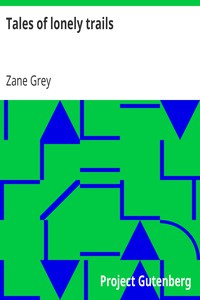Tales of lonely trails by Zane Grey (best affordable ebook reader .TXT) 📗

- Author: Zane Grey
Book online «Tales of lonely trails by Zane Grey (best affordable ebook reader .TXT) 📗». Author Zane Grey
When the pack train reached the rim we rode on, and now through a magnificent forest at eight thousand feet altitude. Big white and black clouds obscured the sun. A thunder shower caught us. There was hail, and the dry smell of dust, and a little cold rain. Romer would not put on his slicker. Haught said the drought had been the worst he had seen in twenty years there. Up in this odorous forestland I could not see where there had been lack of rain. The forest appeared thick, grassy, gold and yellow and green and brown. Thickets and swales of oaks and aspens were gorgeous in their autumn hues. The silver spruces sent down long, graceful branches that had to be brushed aside or stooped under as we rode along. Big gray squirrels with white tails and tufted ears ran up trees to perch on limbs and watch us go by; and other squirrels, much smaller and darker gray, frisked and chattered and scolded at a great rate.
We passed little depressions that ran down into ravines, and these, Haught informed me, were the heads of canyons that sloped away from the rim, deepening and widening for miles. The rim of the mesa was its highest point, except here and there a few elevations like Black Butte. Geologically this mesa was an enormous fault, like the north rim of the Grand Canyon. During the formation of the earth, or the hardening of the crust, there had been a crack or slip, so that one edge of the crust stood up sheer above the other. We passed the heads of Leonard Canyon, Gentry, and Turkey Canyons, and at last, near time of sunset, headed down into beautifully colored, pine-sloped, aspen-thicketed Beaver Dam Canyon.
A mile from the rim we were deep in the canyon, walled in by rock-strewn and pine-timbered slopes too steep for a horse to climb. There was a little gully on the black soil where there were no evidences of recent water. Haught said he had never seen Beaver Dam Creek dry until this season. We traveled on until we came to a wide, open space, where three forks of this canyon met, and where in the middle of this glade there rose a lengthy wooded bench, shaded and beautified by stately pines and silver spruce. At this point water appeared in the creek bed, flowing in tiny stream that soon gathered volume. Cold and clear and pure it was all that was needed to make this spot an ideal camp site. Haught said half a mile below there was a grassy park where the horses would graze with elk.
We pitched our tents on this bench, and I chose for my location a space between two great monarchs of the forests, that had surely shaded many an Indian encampment. At the upper end of the bench rose a knoll, golden and green with scrub oaks, and russet-colored with its lichened rocks. About all we could manage that evening was to eat and go to bed.
Morning broke cool and bright, with heavy dew. I got my boots as wet as if I had waded in water. This surprised me, occurring on October sixth, and at eight thousand feet altitude, as I had expected frost. Most of this day was spent in making camp, unpacking, and attending to the many necessary little details that make for comfort in the open. To be sure Romer worked very spasmodically. He spent most of his time on the back of one of Haught's burros, chasing and roping another. I had not remembered seeing the lad so happily occupied.
Late in the afternoon I slipped off down the canyon alone, taking Haught's rifle for safety rather than a desire to kill anything. By no means was it impossible to meet a bad bear in that forest. Some distance below camp I entered a ravine and climbed up to the level, and soon found myself deep in the fragrant, colorful, wild forest. Like coming home again was it to enter that forest of silver-tipped, level-spreading spruce, and great, gnarled, massive pines, and oak-patches of green and gold, and maple thickets, with shining aspens standing white against the blaze of red and purple. High, wavy, bleached grass, brown mats of pine needles, gray-green moss waving from the spruces, long strands of sunlight—all these seemed to welcome me.
At a distance there was a roar of wind through the forest; close at hand only a soft breeze. Rustling of twigs caused me to compose myself to listen and watch. Soon small gray squirrels came into view all around me, bright-eyed and saucy, very curious about this intruder. They began to chatter. Other squirrels were working in the tops of trees, for I heard the fall of pine cones. Then came the screech of blue jays. Soon they too discovered me. The male birds were superb, dignified, beautiful. The color was light blue all over with dark blue head and tufted crest. By and bye they ceased to scold me, and I was left to listen to the wind, and to the tiny patter of dropping seeds and needles from the spruces. What cool, sweet, fresh smell this woody, leafy, earthy, dry, grassy, odorous fragrance, dominated by scent of pine! How lonesome and restful! I felt a sense of deep peace and rest. This golden-green forest, barred with sunlight, canopied by the blue sky, and melodious with its soughing moan of wind, absolutely filled me with content and happiness. If a stag or a bear had trotted out into my sight, and had showed me no animosity, not improbably I would have forgotten my gun. More and more as I lived in the open I grew reluctant to kill.
Presently a porcupine waddled along some rods away, and unaware of my presence it passed by and climbed a spruce. I saw it climb high and finally lost sight of it. In searching up and down this spruce I grew alive to what a splendid and beautiful tree it was. Where so many trees grew it always seemed difficult to single out one and study it. This silver spruce was five feet through at the base, rugged, gray-seamed, thick all the way to its lofty height. Its branches were small, with a singular feature that they were uniform in shape, length, and droop. Most all spruce branches drooped toward the ground. That explained why they made such excellent shelters from rain. After a hard storm I had seen the ground dry under a thick-foliaged spruce. Many a time had I made a bed under one. Elk and deer stand under a spruce during a rain, unless there is thunder and lightning. In forests of high altitude, where lightning strikes many trees, I have never found or heard of elk and deer being killed. This particular spruce was a natural tent in the forest. The thick-spreading graceful silver plumes extended clear to the top, where they were bushiest, and rounded out, with all the largest branches there. Each dark gray branch was fringed and festooned with pale green moss, like the cypresses of the South.
Suddenly I heard a sharp snapping of twigs and then stealthy, light steps. An animal of some species was moving in the thicket nearby. Naturally I sustained a thrill, and bethought me of the rifle. Then I peered keenly into the red rose shadows of the thicket. The sun was setting now, and though there appeared a clear golden light high in the forest, along the ground there were shadows. I heard leaves falling, rustling. Tall white aspens stood out of the thicket, and two of the large ones bore the old black scars of bear claws. I was sure, however, that no bear hid in the thicket at this moment. Presently whatever the animal was it pattered lightly away on the far side. After that I watched the quiver of the aspen leaves. Some were green, some yellow, some gold, but they all had the same wonderful tremor, the silent fluttering that gave them the most exquisite action in nature. The sun set, the forest darkened, reminding me of supper time. So I returned to camp. As I entered the open canyon Romer-boy espied me—manifestly he had been watching—and he yelled: "Here comes my Daddy now!... Say, Dad, did you get any pegs?"
Next morning Haught asked me if I would like to ride around through the woods and probably get a shot at a deer. Romer coaxed so to go that I finally consented.
We rode down the canyon, and presently came to a wide grassy park inclosed by high green-clad slopes, the features of which appeared to be that the timber on the west slope was mostly pine, and on the east slope it was mostly spruce. I could arrive at no certain reason for this, but I thought it must be owing to the snow lying somewhat longer on the east slope. The stream here was running with quite a little volume of water. Our horses were grazing in this park. I saw fresh elk tracks made the day before. Elk were quite abundant through this forest, Haught informed me, and were protected by law.
A couple of miles down this trail the canyon narrowed, losing its park-like dimensions. The farther we traveled the more water there was in the stream, and more elk, deer, and turkey tracks in the sand. Every half mile or so we would come to the mouth of a small intersecting canyon, and at length we rode up one of these, presently to climb out on top. At this distance from the rim the forest was more open than in the vicinity of our camp, affording better riding and hunting. Still the thickets of aspen and young pine were so frequent that seldom could I see ahead more than several hundred yards.
Haught led the way, I rode next and Romer kept beside me where it was possible to do so. There was, however, no trail. How difficult to keep the lad quiet! I expected of course that Haught would dismount, and take me to hunt on foot. After a while I gathered he did not hunt deer except on horseback. He explained that cowboys rounded up cattle in this forest in the spring and fall, and deer were not frightened at sound or sight of a horse. Some of the thrill and interest in the forest subsided for me. I did not like to hunt in a country where cattle ranged, no matter how wild they were. Then when we came to a forested ridge bare of grass and smelling of sheep, that robbed the forest of a little more glamour. Mexican sheep-herders drove their flocks up this far sometimes. Haught





Comments (0)